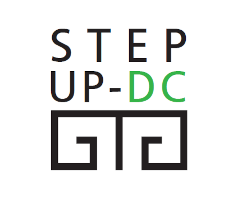Session 6.3, Exploring the controversial aspects of social issues and their management in the classroom
STEPUP-DC Project
Description

Course DescriptionDuration
The duration of the session is 9 hours (3 reading + 3 learning + 3 working/practicing)
Objectives
The objectives of this session are:
- Support students in developing in-depth, critical understanding of the role of education and particularly of formal education in the development of children’s / young citizens’ political socialisation;
- Develop students’ confidence in leading initiatives and developing educational programmes on EDC/HRE/IE;
- Familiarise students with key tools on EDC/HRE including the Council of Europe’s Framework for the development of democratic culture.
Prerequisites/Prior Knowledge
Previous sessions of the Module
Learning outcomes
After completion of the session students will:
- Have a clear understanding of the notion of controversial issues and its role in the educational process;
- Be aware of relevant approaches to and methods of teaching or tackling controversial issues in the classroom;
- Be able to apply the aforementioned methods in the classroom for the development of competences for democratic culture
Basic Topics
- Definition of controversial issues and their value in the educational process;
- Teaching Controversial Issues approaches and methods.
Outcomes and CDC
- Values
- 8: Promotes the view that one should always strive for mutual understanding and meaningful dialogue between people and groups who are perceived to be “different” from one another (basic)
- Knowledge and critical understanding:
- 111: Can reflect critically on his/her own emotions and feelings in a wide range of situations (advanced)
- 120: Can reflect critically on how his/her own world view is just one of many world views (advanced)
- Attitudes
- 27: Gives space to others to express themselves (basic)
- 32: Expresses respect for people who hold different political opinions from himself/herself (advanced)
- 45: Expresses the belief that he/she can carry out activities that he/she has planned (basic)
- 49: Shows confidence that he/she knows how to handle unforeseen situations due to his/her resourcefulness (advanced)
- Skills
- 54: Works well in unpredictable circumstances (intermediate)
- 93: Can avoid successfully intercultural misunderstandings (advanced)
- 99: When working with others, supports other people despite differences in points of view (advanced)
- 103: Can encourage the parties involved in conflicts to actively listen to each other and share their issues and concerns (intermediate)
Resources
- Kerr, D., & Huddleston, T. (2015). Living with Controversy: Teaching Controversial Issues Through Education for Democratic Citizenship and Human Rights (EDC/HRE). Training Pack for Teachers. Strasbourg. Available from https://rm.coe.int/16806948b6
- Jackson, R. (2014). Signposts: Policy and Practice for Teaching about Religions and Non-religious Worldviews in Intercultural Education. Strasbourg: Council of Europe. Available from https://theewc.org/resources/signposts/
- Kerr, D., & Huddleston, T. (2017). Managing Controversy: Developing a Strategy for Handling Controversy and Teaching Controversial Issues in Schools. A Self-Reflection Tool for School Leaders and Senior Managers. Strasbourg. Available from https://rm.coe.int/16806ecd25
Recommended online tools
Duration
The duration of the session is 9 hours (3 reading + 3 learning + 3 working/practicing)
Objectives
The objectives of this session are:
- Support students in developing in-depth, critical understanding of the role of education and particularly of formal education in the development of children’s / young citizens’ political socialisation;
- Develop students’ confidence in leading initiatives and developing educational programmes on EDC/HRE/IE;
- Familiarise students with key tools on EDC/HRE including the Council of Europe’s Framework for the development of democratic culture.
Prerequisites/Prior Knowledge
Previous sessions of the Module
Learning outcomes
After completion of the session students will:
- Have a clear understanding of the notion of controversial issues and its role in the educational process;
- Be aware of relevant approaches to and methods of teaching or tackling controversial issues in the classroom;
- Be able to apply the aforementioned methods in the classroom for the development of competences for democratic culture
Basic Topics
- Definition of controversial issues and their value in the educational process;
- Teaching Controversial Issues approaches and methods.
Outcomes and CDC
- Values
- 8: Promotes the view that one should always strive for mutual understanding and meaningful dialogue between people and groups who are perceived to be “different” from one another (basic)
- Knowledge and critical understanding:
- 111: Can reflect critically on his/her own emotions and feelings in a wide range of situations (advanced)
- 120: Can reflect critically on how his/her own world view is just one of many world views (advanced)
- Attitudes
- 27: Gives space to others to express themselves (basic)
- 32: Expresses respect for people who hold different political opinions from himself/herself (advanced)
- 45: Expresses the belief that he/she can carry out activities that he/she has planned (basic)
- 49: Shows confidence that he/she knows how to handle unforeseen situations due to his/her resourcefulness (advanced)
- 27: Gives space to others to express themselves (basic)
- Skills
- 54: Works well in unpredictable circumstances (intermediate)
- 93: Can avoid successfully intercultural misunderstandings (advanced)
- 99: When working with others, supports other people despite differences in points of view (advanced)
- 103: Can encourage the parties involved in conflicts to actively listen to each other and share their issues and concerns (intermediate)
- 54: Works well in unpredictable circumstances (intermediate)
Resources
- Kerr, D., & Huddleston, T. (2015). Living with Controversy: Teaching Controversial Issues Through Education for Democratic Citizenship and Human Rights (EDC/HRE). Training Pack for Teachers. Strasbourg. Available from https://rm.coe.int/16806948b6
- Jackson, R. (2014). Signposts: Policy and Practice for Teaching about Religions and Non-religious Worldviews in Intercultural Education. Strasbourg: Council of Europe. Available from https://theewc.org/resources/signposts/
- Kerr, D., & Huddleston, T. (2017). Managing Controversy: Developing a Strategy for Handling Controversy and Teaching Controversial Issues in Schools. A Self-Reflection Tool for School Leaders and Senior Managers. Strasbourg. Available from https://rm.coe.int/16806ecd25
Recommended online tools
